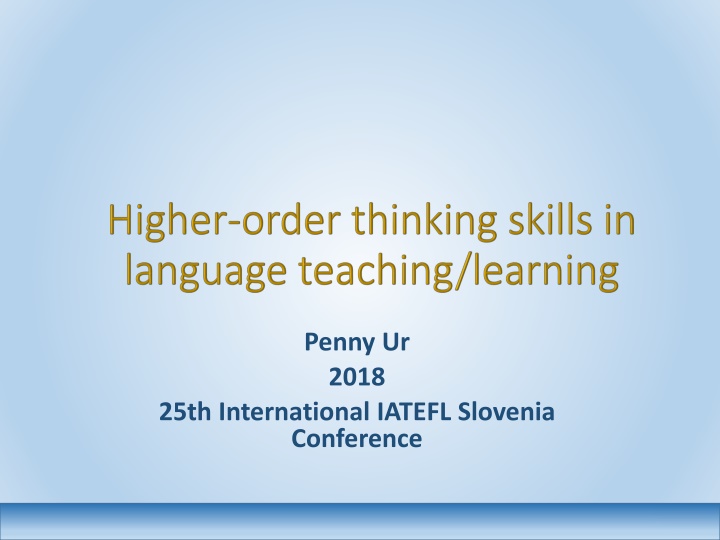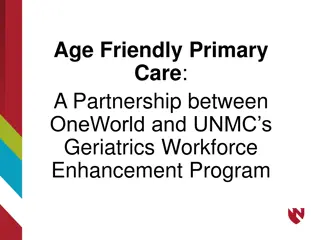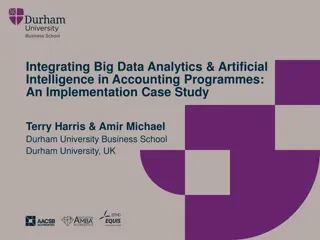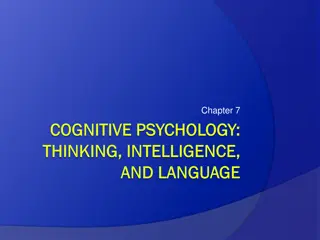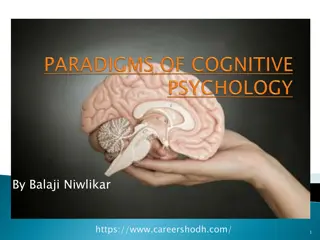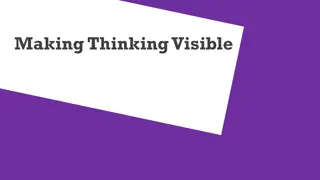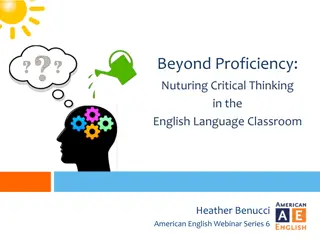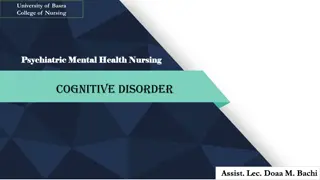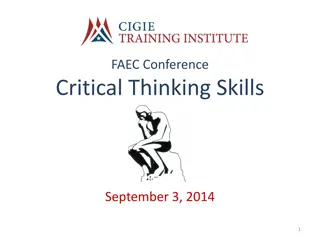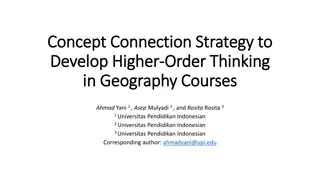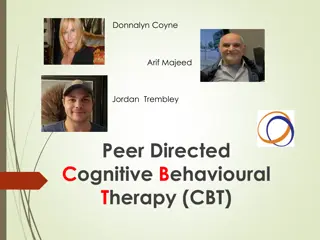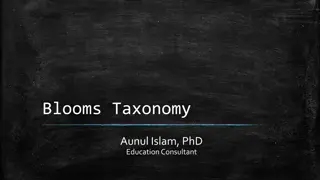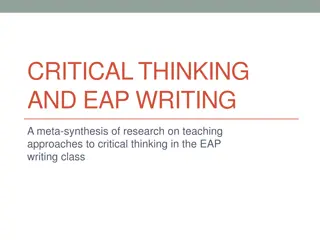Enhancing Cognitive Skills through Higher-Order Thinking in Education
Exploring the importance of higher-order thinking skills in education, this content delves into the distinction between lower and higher-order skills, the elements of Blooms' taxonomy, and the significance of critical and creative thinking. It highlights the value of analysis, precision, logic, criticism, and divergent thinking in intellectual development and language learning, emphasizing deep processing for better retention and understanding of new language items.
Download Presentation

Please find below an Image/Link to download the presentation.
The content on the website is provided AS IS for your information and personal use only. It may not be sold, licensed, or shared on other websites without obtaining consent from the author.If you encounter any issues during the download, it is possible that the publisher has removed the file from their server.
You are allowed to download the files provided on this website for personal or commercial use, subject to the condition that they are used lawfully. All files are the property of their respective owners.
The content on the website is provided AS IS for your information and personal use only. It may not be sold, licensed, or shared on other websites without obtaining consent from the author.
E N D
Presentation Transcript
Penny Ur 2018 25th International IATEFL Slovenia Conference
Higher-order thinking skills are those which involve mental effort, which may take various forms (e.g. problem-solving, contrasting, applying, classifying, creating ). Lower-order thinking skills need little effort, and are mainly associated with recall or identification of surface facts or forms.
Blooms taxonomy Convergent versus divergent Critical thinking Creative thinking
Analysis: being able to distinguish between categories, generalize, exemplify etc. Precision: being aware of imprecision (vague, contradictory or tautologous statements) in input and one s own self-expression Logic: being aware of illogical reasoning in input and taking care to be logical in one s own thinking Criticism: not taking for granted; being able to to apply criteria in order to evaluate
The ability to think up original solutions to problems The ability to create new constructs, interpretations or works of art
Divergent thinking: brainstorming a large number of responses to any cue or task Original or lateral thinking: devising original, unconventional responses to problems or tasks De Bono, 1967
Language learning Intellectual development Educational values Interest
New language items are better imprinted on our memory if we use deep processing. This means relating the item meaningfully to its meanings and to other items previously learnt. Deeper processing inevitably involves higher- order thinking skills Waters, 2006
The learning of facts and concepts. + The ability to relate these to each other, criticize, draw conclusions, create new ideas etc.
The ability and willingness to think for oneself As distinct from the unthinking acceptance of facts, values, directives etc. laid down by an authority.
Activities based on simple recall or knowledge of isolated forms and meanings tend to be boring. Activities based on higher-order thinking skills are likely to be more interesting.
1. A. A rooster 2. B. A sheep 3. C. A rabbit 4. D. A cat 5. E. A dog 6. F. A duck
a clock, a dog, a dress, a mother, black, a pen, bread, trousers, a bag, a frog, red, boots, a cat, rice, a man, a baby, pink,a teenager, a hat, a t-shirt, a banana, a book, a sheep, meat, kids, a table, green, an elephant, sugar, white animals colours things food clothes people (vocabulary)
1. angry a. unhappy and angry because someone has something you want b. feeling pleasure or satisfaction 2. sad 3. jealous c. lacking interest or energy 4. confident d. having a strong feeling against someone or something that makes you want to shout or hurt them e. unhappy or sorry 5. tense 6. doubtful f. nervous, anxious, unable to relax 7. apathetic g. uncertain about something 8. happy h. sure or trusting 16
1. I felt angry because 2. I felt sad although 3. I felt jealous when 4. I felt confident so 5. I felt tense although 6. I felt doubtful because 7. I felt apathetic so 8. I felt happy when 17
What classes do the following belong to? a hammer a tool sadness a table - a mother - a palace - December - winter - biology - tennis (vocabulary)
Gapfill Sentence-completion items
Q1 - Stratford is the town ____ Shakespeare was born in. a. where b. which c. Either could be used here. Q2 - The hotel ____ we stayed was good. a. where b. which c. Either could be used here. Q3 - The man ____ interviewed me seemed friendly enough. a. who b. which c. Either could be used here. Q4 - The British Prime Minister, ____ was interviewed yesterday, denied responsibility. a. who b. that c. Either could be used here. Q5 - The car ____ was stolen belonged to my partner. a. which b. that c. Either could be used here.
Define the following items: Example: A hammer is a tool which a cow Canada a chicken a carpenter cigarettes coffee a cinema Christmas (relative pronouns and clauses)
List 1 List 2 List 3 Australia apples August an airport an artist an African an alligator air a book Bangladesh bread a bedroom a baby bottles a bus a birthday a cow Canada a chicken a carpenter cigarettes coffee a cinema Christmas List 4 List 5 List 6 a duck a doctor Denmark doors December a dream a daughter disinfectant eyes England an elephant the evening an emperor an engine economics eight Hollywood a helicopter hands a hotel happiness a hairdresser history a horse Ur, Grammar practice activities, 2009
Here is a list of sentences. 1. We have been working here for a long time. 2. They have been in the country since 1995. 3. The program has been going on for ten minutes. 4. I have loved this singer since the beginning of her career. 5. We have been studying English for four years. 6. She has lived in Haifa since she got married. When do you use since andwhen do you use for? (grammar)
Do these make sense? 1. an objective opinion 2. a definite maybe 3. an exact estimate 4. the larger half (vocabulary, critical reading)
Whats wrong with these? 1.A free gift 2.A new innovation. 3.We made too many wrong mistakes 4.He exaggerated the situation too much. 5.It s pure undiluted orange juice. 6.Let s meet together at six. 7.They commute back and forth every day. (vocabulary, critical reading)
What (unsubstantiated) assumptions underlie these statements? 1. This food is composed entirely of natural ingredients, so it is good for you as well as being delicious. 2. This method is scientifically proven to be effective 3. Thousands of people have already signed up: join now! 4. Don t use this method: it is based on outdated, old-fashioned ideas. 5. Everyone knows that the earlier you start learning a language the more successfully you will master it. (critical reading, writing)
Whats wrong with these? 1. These people drink a lot of red wine and have few heart problems: so drinking red wine is good for your heart. 2. The boy told me he d left his book at home, but it was in fact in his bag: so he was lying. That shows he is a liar. 3. The word education comes from a Latin word meaning to draw out , so education is about drawing out people s potential. 4. She spends a lot of time reading, so she reads very well. (critical reading, writing)
Whats wrong with these sentences? 1.We need more comprehensive schools. 2.Visiting relatives can be boring. 3.Ambulance man helps dog bite victim 4.Enraged cow injures farmer with ax 5.Juvenile court to try shooting defendant 6.Stolen painting found by tree 7.Two sisters reunited after 18 years in checkout counter 8.Kids make nutritious snacks (linguistic awareness, contrastive analysis)
What would be your conclusion from this evidence? She s wearing a white coat. She s wearing a stethoscope round her neck. I saw her examining a patient. In her office there s a certificate that says she graduated from medical school. She was interviewed on television about a disease. There s a notice outside her door that says Dr Smith . She must be a doctor. (grammar: must/ can t of logical necessity)
He never smiles. We sometimes see him cry. The funniest jokes can t make him laugh. He stays at home all the time. He can t be very happy. He must be unhappy He must be depressed (grammar: must/ can t of logical necessity)
Insert an appropriate conjunction: because / since, although/in spite of the fact that, so/therefore, but/however/nevertheless, and, moreover/in addition, if / provided that 1. She is a good teacher she hasn t had much training. 2. I know they are here I saw them a moment ago. 3. She has ten children she still has time to write books. 4. He is a good boss he has a sense of humour. 5. We will come we get an invitation. 6. We will certainly come we have plenty of time. 7. He s lived in the US all his life he must know English. 8. He is a good speaker I don t like him very much. 9. There isn t much water in the desert not many plants can grow there. 10. It seems there s plenty of time we need to get started immediately. (conjunctions)
How many things can you think of to say about this picture? (oral fluency) How many ways can you think of to solve this dilemma? (oral fluency) How many ways can you think of to compare a train with a car? (comparatives) How many endings can you think of for the sentence: If I had a million dollars ? (conditionals)
How many ways can you think of to use an empty tin can? (A pen? A piece of plasticine?) (oral fluency, can/could) How many adjectives can you think of to describe the noun road? movie? song? (grammar: adjective-before-noun, vocabulary) How many nouns can you think of that could be described by the adjective clear? (hard? black?) (adjective-before-noun, vocabulary)
1.Think of ten ways to compare a computer with a piece of spaghetti. 2.Find six questions to which the answer is twelve (tomorrow of course! my mother ) 3.Suggest at least three advantages of being an only child? (Of not having a cellphone? Of having no car?)
4. Name ten things you have never done. 5. Name six things that you can t touch, and why. 6. Say six negative things about a pen a cat English. 7. Say four NICE things about your friend, using negative sentences. 36
Today critical thinking skills need to be employed in the course of exposure to Internet information . Most of it in English.
(true) facts partial facts facts + non-facts opinions disguised as facts misinformation
fake news truthiness post-truth advertorials
Just because its written up there doesnt necessarily mean it s true. How do I know?
NASA WARNS 'PLANET X' IS HEADED STRAIGHT FOR EARTH PERMANENT CLOSURE AT WALT DISNEY WORLD DUE TO HURRICANE IRMA
The content is unlikely and sensational It arouses a strong positive or negative reaction (you want it/don t want it to be true) It s trying to persuade you to spend money You saw it on a website you haven t met before It reached you through social media or email The headline is big, capitalized, maybe with exclamation marks It has no date or acknowledged author. It provides no evidence or sources of information
(News item) Is it likely? Is it an advertisement? Is the argument logical? Is there evidence? Who wrote it? Is the journal / newspaper / website likely to be objective? Or does it have commercial or political interests?
In the light of the OECD report, I was interested to know whether students use/prefer digital textbooks. There s plenty of research providing conflicting evidence: yes and no.
